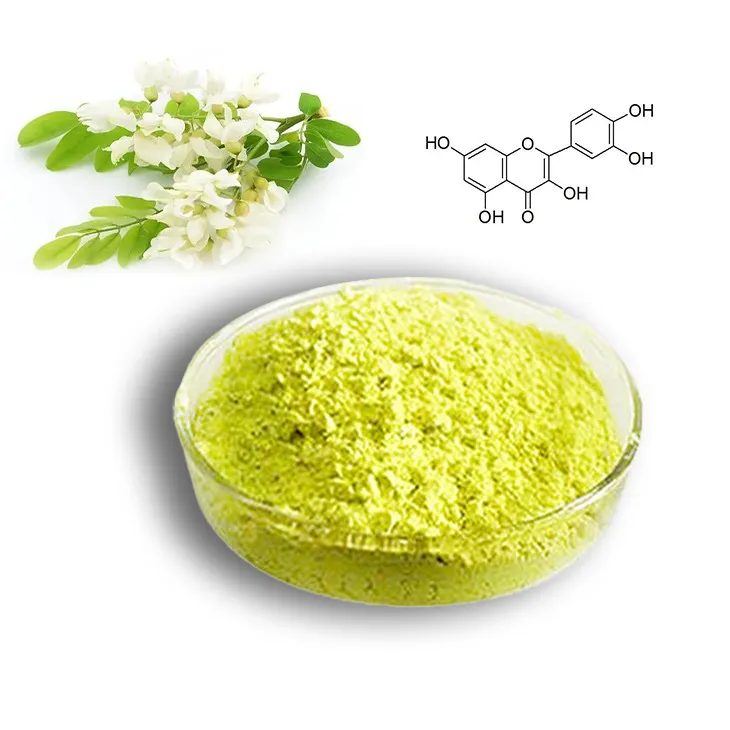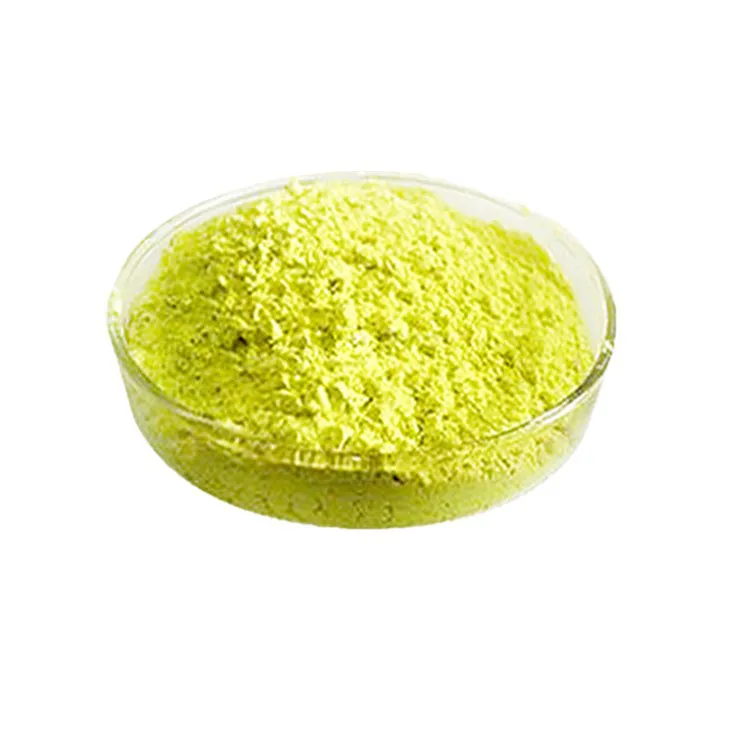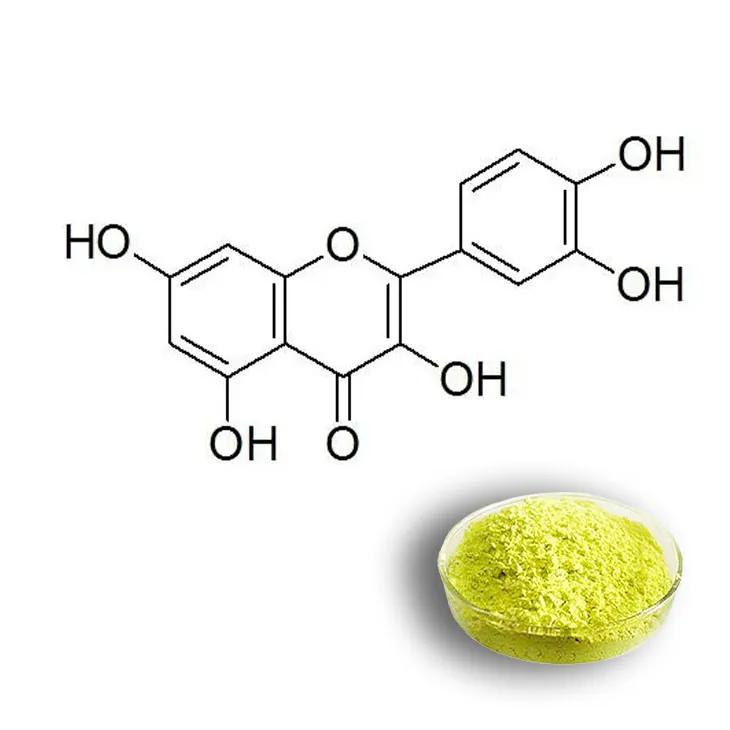- 0086-571-85302990
- sales@greenskybio.com
Expert Tips for Effective Wholesale Quercetin Purchasing.
2024-12-14

Introduction
Quercetin, a flavonoid with numerous potential health benefits, has seen an increase in demand in various industries such as pharmaceuticals, nutraceuticals, and food supplements. For businesses looking to source Quercetin at a wholesale level, it is crucial to make informed decisions to ensure quality, cost - effectiveness, and a reliable supply chain. This article will provide expert - based tips on wholesale Quercetin purchasing, covering aspects such as supplier selection, quality verification, and price negotiation.

Supplier Selection
1. Reputation and Experience
When choosing a quercetin wholesale supplier, reputation is key. Look for suppliers with a long - standing history in the industry. A well - established supplier is more likely to have reliable production processes, quality control measures, and a good track record of customer satisfaction.
- Check for reviews and testimonials from other businesses. Online platforms, industry forums, and business directories can be great sources of information.
- Inquire about the supplier's experience in handling quercetin specifically. Suppliers who have been dealing with quercetin for a longer time are likely to have more in - depth knowledge about its production, quality control, and potential challenges.
2. Certifications and Compliance
Ensure that the supplier has the necessary certifications. For quercetin used in the food and supplement industries, relevant certifications may include Good Manufacturing Practice (GMP) certifications.
- GMP - certified suppliers follow strict guidelines in terms of production, quality control, and documentation. This helps to ensure that the quercetin you purchase is produced in a clean, safe, and controlled environment.
- Also, check for compliance with regulatory standards such as those set by the Food and Drug Administration (FDA) in the United States or similar regulatory bodies in other countries. This is especially important if you plan to distribute the quercetin - containing products in a particular market.
3. Production Capacity and Scalability
Consider the supplier's production capacity. If your business has plans for growth or if you require large - scale, consistent supply of quercetin, you need a supplier who can meet your demands.
- Inquire about their current production volume and their ability to scale up production if needed. A supplier with limited production capacity may not be able to keep up with your growing needs, leading to potential supply disruptions.
- Additionally, find out about their lead times. A shorter lead time can be advantageous, especially when you need to restock quickly or respond to sudden market demands.

Quality Verification
1. Purity and Composition
Verify the purity of the quercetin being supplied. High - quality quercetin should have a high level of purity, typically measured as a percentage of the active ingredient.
- Request the supplier to provide detailed specifications regarding the purity of their quercetin. This may include information on the presence of impurities or other substances.
- Analyze the composition of the quercetin. It should be free from contaminants such as heavy metals, pesticides, and harmful solvents. Laboratory testing can be used to confirm the absence of such contaminants.
2. Source of Raw Materials
The source of the raw materials used to produce quercetin can have a significant impact on its quality. Inquire about where the supplier obtains the raw materials.
- Ideally, the raw materials should be sourced from reliable and sustainable sources. For example, if the quercetin is derived from plant sources, ensure that the plants are grown in a clean environment, free from excessive pesticide use and environmental pollution.
- Some suppliers may source their raw materials from different regions or countries. Understand the implications of these sourcing choices on the quality, cost, and availability of the quercetin.
3. Quality Control Processes
Ask about the supplier's quality control processes. A good supplier should have robust quality control measures in place at every stage of production.
- This may include raw material inspection, in - process quality checks, and final product testing. For example, during raw material inspection, the supplier should verify the identity, purity, and quality of the incoming materials.
- In - process quality checks can help to detect and correct any issues during production, ensuring that the final product meets the required quality standards. Final product testing should cover aspects such as purity, potency, and stability.

Price Negotiation
1. Market Research
Before entering into price negotiations, conduct thorough market research. Understand the current market price range for quercetin at the wholesale level.
- Look at industry reports, market analysis websites, and trade publications. These sources can provide valuable information on price trends, supply and demand dynamics, and factors that may influence the price of quercetin.
- Compare prices offered by different suppliers. However, keep in mind that the lowest price may not always be the best option, as it could be associated with lower quality or unreliable service.
2. Volume and Long - Term Contracts
If your business has the capacity to purchase large volumes of quercetin, use this as a bargaining chip during price negotiations.
- Suppliers are often more willing to offer discounts for large - volume orders. Consider entering into long - term contracts with the supplier. A long - term contract can provide stability for both parties and may result in more favorable pricing terms.
- When negotiating a long - term contract, ensure that the terms are clear and include provisions for price adjustments based on market fluctuations, quality requirements, and delivery schedules.
3. Added - Value Services
Look for opportunities to negotiate added - value services in addition to price. These services can enhance the overall value of your purchase.
- For example, ask the supplier if they can provide custom packaging, faster delivery times, or technical support. If the supplier is able to offer these services at no additional cost or at a reduced cost, it can be a significant advantage for your business.
- Another aspect to consider is the supplier's ability to provide product samples for testing and development purposes. This can be especially useful if you are planning to develop new products containing quercetin.

Conclusion
Effective wholesale quercetin purchasing requires careful consideration of multiple factors. By following these expert tips on supplier selection, quality verification, and price negotiation, businesses can ensure that they obtain high - quality quercetin at a reasonable cost, while also establishing a reliable and sustainable supply chain. Making informed decisions in these areas will not only benefit the bottom line of the business but also contribute to the success of products containing quercetin in the market.
FAQ:
Q1: What are the key factors to consider when selecting a quercetin wholesale supplier?
When choosing a quercetin wholesale supplier, several factors are crucial. Firstly, reputation matters. Look for suppliers with a good track record in the industry, positive customer reviews, and a history of reliable deliveries. Secondly, consider their production capabilities. Ensure they can meet your quantity requirements without sacrificing quality. Thirdly, check their compliance with relevant regulations and quality standards, such as Good Manufacturing Practice (GMP). Also, it's beneficial to assess their customer service. A supplier that can respond promptly to inquiries and resolve issues efficiently is highly desirable.
Q2: How can one verify the quality of wholesale quercetin?
To verify the quality of wholesale quercetin, start by checking the product's certificates. Suppliers should be able to provide certificates of analysis that detail the purity, potency, and other quality parameters. You can also request samples for independent laboratory testing. Look for signs of proper storage and handling, as improper conditions can affect the quality. Additionally, consider the source of the quercetin. If it is derived from high - quality raw materials and processed using advanced techniques, it is more likely to be of good quality.
Q3: What are some effective strategies for negotiating the price of wholesale quercetin?
When negotiating the price of wholesale quercetin, do your research first. Know the market price range so you can have a reasonable target. Bulk purchasing is often a good leverage point. If you can commit to larger quantities, you may be able to negotiate a lower unit price. Compare offers from different suppliers and use this as a bargaining chip. Also, consider long - term partnerships. Suppliers may be more willing to offer favorable prices if they anticipate a consistent business relationship. Be flexible in payment terms as well, as this can sometimes lead to price concessions.
Q4: Are there any specific regulations for wholesale quercetin?
Yes, there are regulations governing wholesale quercetin. In many regions, it must comply with food or dietary supplement regulations depending on its intended use. For example, in the United States, it needs to meet the requirements of the Food and Drug Administration (FDA) for dietary supplements. This includes proper labeling, safety, and quality control. In the European Union, it has to adhere to the relevant directives on food supplements. Suppliers should be aware of and compliant with these regulations to ensure legal and safe trading.
Q5: How can one ensure the stability of the supply of wholesale quercetin?
To ensure the stability of the supply of wholesale quercetin, sign a clear supply agreement with the supplier. The agreement should specify quantities, delivery schedules, and contingency plans in case of unforeseen events. Diversify your supplier base to some extent. Relying on a single supplier can be risky, so having alternative sources can help maintain supply continuity. Additionally, maintain good communication with the supplier. Regularly update on your demand forecasts and work together to address any potential supply - related issues.
Related literature
- Quercetin: Production, Health Benefits and its Market Potential"
- "Quality Control in Quercetin Wholesale: Best Practices"
- "The Regulatory Landscape of Quercetin in the Global Market"
- ▶ Hesperidin
- ▶ citrus bioflavonoids
- ▶ plant extract
- ▶ lycopene
- ▶ Diosmin
- ▶ Grape seed extract
- ▶ Sea buckthorn Juice Powder
- ▶ Beetroot powder
- ▶ Hops Extract
- ▶ Artichoke Extract
- ▶ Reishi mushroom extract
- ▶ Astaxanthin
- ▶ Green Tea Extract
- ▶ Curcumin Extract
- ▶ Horse Chestnut Extract
- ▶ Other Problems
- ▶ Boswellia Serrata Extract
- ▶ Resveratrol Extract
- ▶ Marigold Extract
- ▶ Grape Leaf Extract
- ▶ blog3
- ▶ blog4
- ▶ blog5
-
Pure 85% Tomentil Extract.
2024-12-14
-
Diosmin
2024-12-14
-
Mangosteen extract powder
2024-12-14
-
Lemon Balm Extract
2024-12-14
-
Baicalin
2024-12-14
-
Quercetin
2024-12-14
-
Licorice Root Extract Powder
2024-12-14
-
Selenium yeast
2024-12-14
-
Almond Extract Powder
2024-12-14
-
Fenugreek Extract Powder
2024-12-14
-
Hesperidin
2024-12-14




















